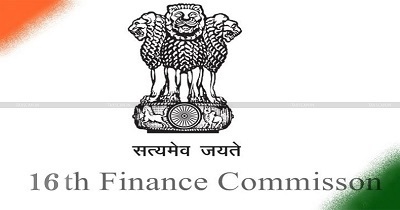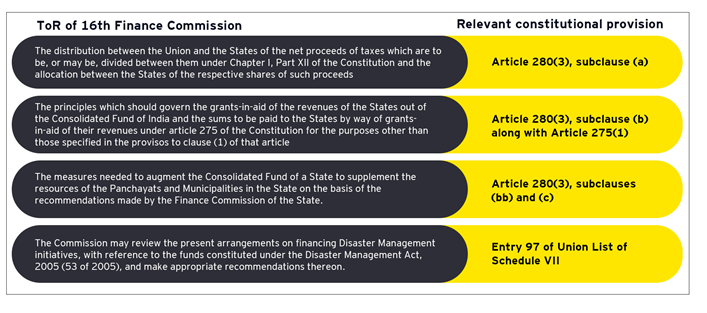Context:
The 16th Finance Commission (FC) has begun its work, focusing on the devolution of the consolidated fund.
Recognition to Local Bodies
The 16th Finance Commission (FC), under Article 280 of the Indian Constitution, focusing primarily on the devolution of the consolidated fund. Following the 73rd and 74th constitutional amendments, local bodies have gained significant recognition within the federal system. These amendments introduced sub-clauses 280 (3) (bb) and (c), mandating the FC to recommend measures to augment State consolidated funds to support panchayats and municipalities.
The Role of Cities
- Cities as Engines of Growth
- The National Commission on Urbanisation in the mid-80s described cities as “engines of growth,” contributing around 66% of India’s GDP and about 90% of total government revenues. However, the economic scale remains insufficient to meet rising needs. The World Bank estimates $840 billion is required for basic urban infrastructure over the next decade.
- The National Commission on Urbanisation in the mid-80s described cities as “engines of growth,” contributing around 66% of India’s GDP and about 90% of total government revenues. However, the economic scale remains insufficient to meet rising needs. The World Bank estimates $840 billion is required for basic urban infrastructure over the next decade.
- Inadequate Financial Devolution
- Despite the efforts of five commissions since the 11th Finance Commission, financial devolution to cities remains inadequate. The fiscal health of municipalities is poor, affecting city productivity and quality of life. Rapid urbanisation without appropriate fiscal action has adverse effects on development. Intergovernmental transfers (IGTs) to Urban Local Bodies (ULBs) in India are about 0.5% of GDP, much lower than the 2-5% typical of other developing nations.
- For instance, South Africa allocates 2.6%, Mexico 1.6%, the Philippines 2.5%, and Brazil 5.1% of their GDPs to their cities. Although IGTs make up about 40% of ULBs’ total revenue, issues persist regarding their predictability, earmarking for vulnerable groups, and horizontal equity. IGTs are crucial for ULBs, given their financial state and the need for stable support until their own revenues improve.
- Despite the efforts of five commissions since the 11th Finance Commission, financial devolution to cities remains inadequate. The fiscal health of municipalities is poor, affecting city productivity and quality of life. Rapid urbanisation without appropriate fiscal action has adverse effects on development. Intergovernmental transfers (IGTs) to Urban Local Bodies (ULBs) in India are about 0.5% of GDP, much lower than the 2-5% typical of other developing nations.
|
The Finance Commission of India
Term of Reference of 16th Finance Commission
|
Taxation System Challenges
- Impact of GST
- The introduction of the Goods and Service Tax (GST) has reduced ULBs’ tax revenue (excluding property tax) from about 23% in 2012-13 to around 9% in 2017-18. IGTs from States to ULBs are very low, with State Finance Commissions recommending only about 7% of States’ own revenue in 2018-19. Increasing the quantum of IGTs as a percentage of GDP is necessary. Despite the 74th constitutional amendment’s aim to financially strengthen ULBs, progress over three decades has fallen short.
- The introduction of the Goods and Service Tax (GST) has reduced ULBs’ tax revenue (excluding property tax) from about 23% in 2012-13 to around 9% in 2017-18. IGTs from States to ULBs are very low, with State Finance Commissions recommending only about 7% of States’ own revenue in 2018-19. Increasing the quantum of IGTs as a percentage of GDP is necessary. Despite the 74th constitutional amendment’s aim to financially strengthen ULBs, progress over three decades has fallen short.
- Parallel Agencies
- The 13th Finance Commission observed that “parallel agencies and bodies are emasculating local governments both financially and operationally.” Local governments require support from Union and State governments through funds, functionaries, and technical aid. However, the growth of parallel agencies has distorted local governments’ roles. Programs like the Member of Parliament Local Area Development Scheme and the Member of Legislative Assembly Local Area Development Scheme exacerbate this issue, distorting the federal structure.
- The 13th Finance Commission observed that “parallel agencies and bodies are emasculating local governments both financially and operationally.” Local governments require support from Union and State governments through funds, functionaries, and technical aid. However, the growth of parallel agencies has distorted local governments’ roles. Programs like the Member of Parliament Local Area Development Scheme and the Member of Legislative Assembly Local Area Development Scheme exacerbate this issue, distorting the federal structure.
Steps to be Taken for Fund Devolution
- Importance of the Census
- In the absence of the 2021 Census, reliance on 2011 data is inadequate for evidence-based fiscal devolution. India has approximately 4,000 statutory towns and an equal number of Census towns, with an estimated 23,000 villages, all of which are effectively urban. These figures must be captured by the 16th FC, including the significant migration to Tier-2 and Tier-3 cities.
- In the absence of the 2021 Census, reliance on 2011 data is inadequate for evidence-based fiscal devolution. India has approximately 4,000 statutory towns and an equal number of Census towns, with an estimated 23,000 villages, all of which are effectively urban. These figures must be captured by the 16th FC, including the significant migration to Tier-2 and Tier-3 cities.
- Revisiting the 15th FC’s Principles
- The 15th FC’s nine guiding principles require a revisit. Not all of them but reference to enhancement in property tax collection in tandem with the State’s GST; maintenance of accounts; resource allocation for mitigating pollution; focus on primary health care, solid waste management, drinking water, etc., deserve attention. The 16th FC must consider India’s urbanisation dynamism and ensure IGTs to urban areas are at least doubled.
- The 15th FC’s nine guiding principles require a revisit. Not all of them but reference to enhancement in property tax collection in tandem with the State’s GST; maintenance of accounts; resource allocation for mitigating pollution; focus on primary health care, solid waste management, drinking water, etc., deserve attention. The 16th FC must consider India’s urbanisation dynamism and ensure IGTs to urban areas are at least doubled.
- Considering International Models of Fund Devolution
- South Africa: South Africa allocates 2.6% of its GDP to cities, significantly higher than India’s 0.5%. This allocation helps support urban infrastructure and services, ensuring better quality of life and economic productivity.
- Mexico and the Philippines: Mexico and the Philippines allocate 1.6% and 2.5% of their GDPs respectively to urban local bodies, supporting urban development and addressing infrastructure needs. These allocations highlight the importance of higher financial support for urban areas.
- Brazil: Brazil stands out with 5.1% of its GDP allocated to cities, demonstrating a strong commitment to urban development. This level of support is crucial for maintaining and improving urban infrastructure, ensuring cities can effectively contribute to national growth.
- South Africa: South Africa allocates 2.6% of its GDP to cities, significantly higher than India’s 0.5%. This allocation helps support urban infrastructure and services, ensuring better quality of life and economic productivity.
Conclusion
The 16th Finance Commission’s work is pivotal for addressing the financial needs of cities, enhancing their role as engines of growth, and improving the quality of life for urban residents. By revisiting the guiding principles of the 15th FC, increasing IGTs, and learning from international models, India can ensure sustainable and equitable urban development. Addressing the challenges posed by rapid urbanisation and strengthening local governments’ financial health will be crucial for India’s overall development trajectory.
|
Probable Questions for UPSC Mains
|
Source: The Hindu








